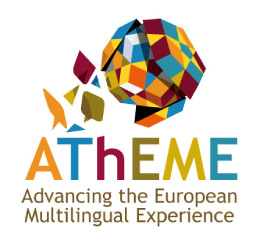ZFP7 Advancing the European Multilingual Experience (AthEME)
Advancing the European Multilingual Experience (AthEME)
Advancing the European Multilingual Experience (AthEME)
Advancing the European Multilingual Experience

AThEME (Advancing the European Multilingual Experience) is a collaborative research project studying multilingualism in Europe. This 5-year research project was set up with funding from the European Commission runs from March 2014 until March 2019. The main objectives of the project are: (1) to investigate cognitive, linguistic and sociological issues in multilingual Europe, (2) to assess existing public policies and practices within the areas of education and health as well as their impact on multilingualism and (3) to contribute to evidence-based policy making. AThEME uses a range of research methodology and aims to raise awareness of multilingualism among policy makers, health professionals, academics and educators.
AThEME is made up of four main research areas within which researchers (17 partner institutions) from Croatia, France, Germany, Italy, Slovenia, Spain, the Netherlands and the United Kingdom work together to study multilingualism. The first group focuses on the regional minority languages in multilingual Europe. Their main objective is to increase the general understanding of what multilingualism with regional minority languages means. From the linguistic perspective, researchers aim to add to the current description and analysis of grammatical diversity of the various regional languages in Europe. From a cognitive point of view, researchers are interested in the effects of language and cognition in various contexts of regional multilingualism. Finally, researchers plan to explore strategies, which can be used to successfully maintain regional bi- and multilingualism.
The second research group investigates heritage languages and heritage language users in the EU. A heritage language is one that families bring with them when they move from one country to another. Researchers first need to understand the sociolinguistic context and the factors contributing to partial language development (when the heritage language is not acquired completely) as well as the attrition of heritage languages (when speakers lose proficiency in their heritage language). Researchers will then investigate the impact heritage languages have on the dominant language.
A third focus of research in AThEME is the relationship between multilingualism and communicative impairment. Many people experience a form of communicative impairment (stutter, dyslexia, Specific Language Impairment (SLI), aphasia). AThEME researchers first aim to increase the evidence base in order to benefit assessments and policies. The second aim is to bring this increased evidence base into concrete tools and applications beneficial to teachers, health care providers and others involved with (the well-being of) communicatively impaired people.
A final research area in this project explores the cognitive aspects of what it means to be multilingual. AThEME researchers are interested in three particular aspects: (1) to gain more knowledge of how factors like age-of-onset (the age at which an individual learns a second language) and language distance (how much one language differs from another) affect the final outcome of a person’s second language acquisition, (2) to investigate the direct effects of multilingualism on human interaction and (3) to collect more data and gain more knowledge of the relationship between language and other mental operations, like attention and memory.
In order to raise general public awareness of multilingualism, AThEME will make use of the already established public engagement and outreach programme Bilingualism Matters (BM). National branches in Croatia, France, Germany, Italy, Netherlands, Slovenia, Spain and the United Kingdom will function as platforms to inform different groups in society about AThEME’s research results, to organise workshops and other events on issues raised by this project and to build a strong, coordinated European network on multilingualism.
Principal researchers
Nuria Sebastian GallesAlbert Costa - UPF
Lisa Cheng - Universiteit Leiden
Norbert Corver - Univeriteit Utrecht
Antonella Sorace - University of Edinburgh
Niels Schiller - Universiteit Leiden
Janel Grijzenhout - Universiteit Leiden
Hamida Demirdache - Nantes
Doug Saddy - University of Reading
Tanja Rinker - Universitat Konstanz
Leonie Corips - Meertens Instituut
Ricardo Etxepare - National de la Recherche Scientifique
Anne Reboul - National de la Recherche Scientifique
Itziar Laka - Universidad de Pais Vasco
Roberto Zamparelli - Universita di Trento
Denis Delfitto - Universita di Verona
Linnaea Stockall - Queen Mary University of London
Maaike Verrips - De Taalstudio
Tihana Kras - Sveucilsta u Rijeci
